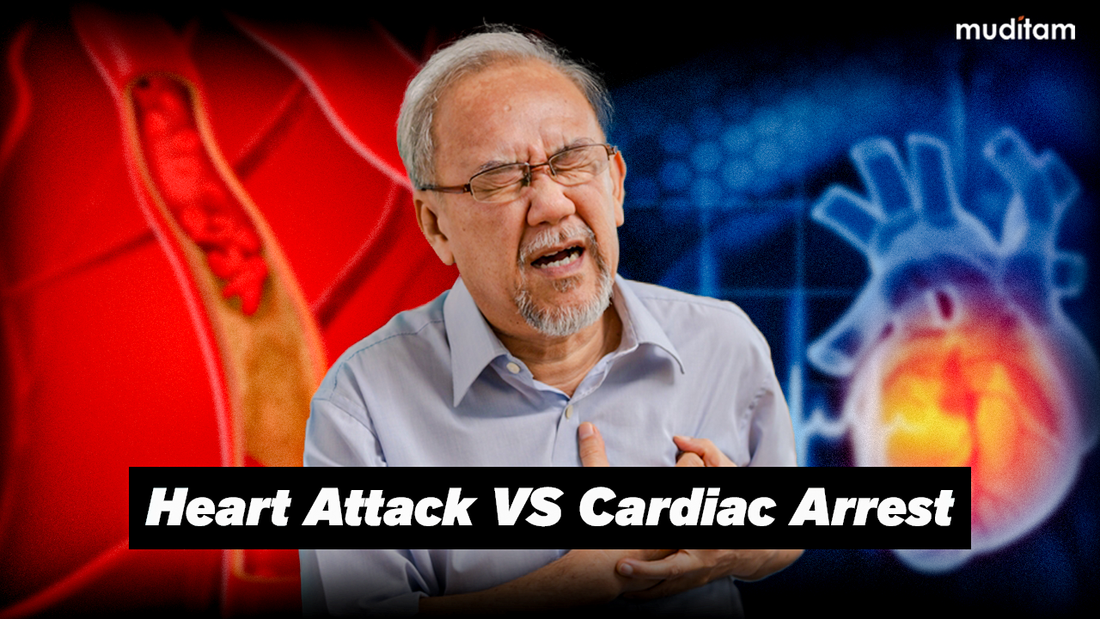
Heart Attack Vs Cardiac Arrest
Share
Heart disease is one of the most prevalent causes of death in the world. Two terms that are often misunderstood by people are heart attack and cardiac arrest. Although both are medical emergencies that require serious attention, they're different. Knowing the difference will help you take the correct action in the event of an emergency.
What is a Heart Attack?

A heart attack occurs when blood flow to the area that is located in your heart gets restricted. This blockage usually occurs by the accumulation of fat, cholesterol, and other compounds, which form an artery plaque. If the plaque ruptures and forms blood clots that block the flow of blood, causing damage to the heart's muscle.
Symptoms of a Heart Attack:
- Pain or discomfort in the chest (feels like pressure, squeeze, or a feeling of fullness)
- The pain in the shoulders, arms, jaw, neck, or back
- Breathing shortness
- Sweating
- Nausea or vomiting
- Dizziness, lightheadedness, or fainting
A heart attack doesn't always result in sudden death. Many patients survive if they receive prompt treatment. But, putting off medical attention could make the damage more severe.
What is Cardiac Arrest?
Cardiac arrest occurs when the heart suddenly ceases beating. It is caused by electrical problems in the heart, which stops its blood flow to lungs, brain, and various organs. If treatment is not given immediately, heart arrest can kill within a matter of minutes.
Symptoms of Cardiac Arrest:
- Sudden collapse
- There is no pulse
- There is no breath
- Confusion loss
In contrast to a heart attack, cardiac arrest can occur without warning. The person who is in cardiac arrest requires immediate CPR (cardiopulmonary revival) and defibrillation in order to restart the heart.
Key Differences Between Heart Attack and Cardiac Arrest
| Feature | Heart Attack | Cardiac Arrest |
|---|---|---|
| Cause | Blockage of blood flow to the heart | Heart disease caused by electrical stimulation |
| Symptoms | The chest is painful, and breathing problems. Nausea, breathing difficulty | A sudden collapse with no pulse, and no breathing |
| Consciousness | Usually aware | Unconscious |
| Immediate Treatment | Medication, lifestyle changes, angioplasty | CPR and defibrillation |
How to Prevent Heart Attacks and Cardiac Arrest
The most effective way to lower the risk of heart disease is to adopt healthier lifestyle decisions. Here are a few steps to ensure your heart is healthy:
- Eat a Heart-Healthy Diet: A diet that is rich in vegetables, fruits, whole grain foods, and nutritious fats can reduce cholesterol levels and maintain your arteries in good shape. Beware of excessive sugar, salt, and processed foods.
- Exercise Regularly: Physical activity is beneficial in maintaining an ideal weight, decreasing stress, and improving the function of your heart. Try to do at least 30 minutes of moderate activity on most weeks.
- Manage Stress: Stress-related stress can make it more likely to develop heart disease. Try yoga, meditation, and deep breath exercises to reduce stress in a way that is effective.
- Quit Smoking and Limit Alcohol: Smoking causes damage to the arteries as well as excessive alcohol consumption can raise blood pressure and cause heart problems.
- Use Ayurvedic Heart Medicine for Heart Health: Ayurvedic treatments have been utilized throughout the ages to help support heart health. Herbs that are natural like Arjuna, Ashwagandha, and Brahmi aid in reducing cholesterol levels, enhancing blood circulation, and enhancing the heart. Ayurvedic Heart Medicine offers a holistic method to keep your heart healthy, by maintaining the balance of your process of the body's own nature.
- Get Regular Health Checkups: Regular check-ups with a doctor are a great way to detect early symptoms of heart disease and help prevent serious complications.
What to Do in Case of a Heart Emergency?
To treat a heart Attack: Call emergency assistance immediately. The patient should take aspirin (if there is no allergy) and remain at peace until medical assistance arrives.
For cardiac arrest: Perform CPR immediately and utilize An Automatic External Defibrillator (AED) If it is available.
Conclusion
Heart attacks and cardiac arrests pose serious illnesses. However, they need different treatment. Recognizing the signs and taking preventive measures could save lives. Maintaining a healthy lifestyle and looking into natural treatments such as Ayurvedic heart supplements will help to maintain the health of the heart.
Being mindful of your body is the greatest gift you can offer yourself. Keep yourself informed, be well, and be proactive when you're in need!



